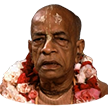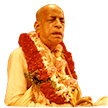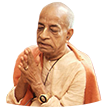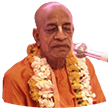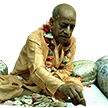Brahma - a glorious personality: Difference between revisions
(Created page with "Category:Glorious Personalities Category:Glorious Personalities from Bhagavad Gita Category:Glorious Personalities from Srimad Bhagavatam Category:Glorious Perso...") |
No edit summary |
||
| Line 11: | Line 11: | ||
{{Personalitiesnav}} | {{Personalitiesnav}} | ||
<!----------------- BEGIN STANDARD HEADING -----------------> | <!----------------- BEGIN STANDARD HEADING -----------------> | ||
Srila Prabhupada's books, lectures, conversations and letters reveal the qualities of this glorious personality as seen in the Vaniquotes '''[[Vaniquotes:Category: | Srila Prabhupada's books, lectures, conversations and letters reveal the qualities of this glorious personality as seen in the Vaniquotes '''[[Vaniquotes:Category:Brahma|Brahma]]''' category. An introduction from his books is given below in the following 12 quotes. | ||
<!----------------- END STANDARD HEADING -----------------> | <!----------------- END STANDARD HEADING -----------------> | ||
---- | ---- | ||
== Quotes from Srila Prabhupada's | == Quotes from Srila Prabhupada's books == | ||
<!----------------- edit quote boxes below this line -----------------> | <!----------------- edit quote boxes below this line -----------------> | ||
{{VaniQuotebox| | {{VaniQuotebox|A Brahma lives for one hundred such years and then dies. A Brahma, who is generally a great devotee of the Lord, attains liberation after such a downfall|A Brahmā lives for one hundred such years and then dies. A Brahmā, who is generally a great devotee of the Lord, attains liberation after such a downfall. The universe (called the brahmāṇḍa, or the round football-like domain controlled by a Brahmā) is thus annihilated, and thus the inhabitants of a particular planet, or of the whole universe, are also annihilated. '''(Śrīmad-Bhāgavatam 2.6.11)'''}} | ||
{{VaniQuotebox| | {{VaniQuotebox|A devotee never considers Lord Narayana to be on the same platform with Lord Brahma and Lord Siva|A pāṣaṇḍī is one who thinks that the Supreme Lord Nārāyaṇa, the Personality of Godhead, is on the same level with the demigods, headed by Lord Brahmā and Lord Śiva. A devotee never considers Lord Nārāyaṇa to be on the same platform with Lord Brahmā and Lord Śiva. The Madhvācārya-sampradāya and Rāmānuja-sampradāya are mainly worshipers of Lord Rāmacandra, although the Śrī Vaiṣṇavas are supposed to be worshipers of Lord Nārāyaṇa and Lakṣmī and the Tattvavādīs are supposed to be worshipers of Lord Kṛṣṇa. '''(Caitanya-caritāmṛta, Madhya-līlā 9.11)'''}} | ||
{{VaniQuotebox| | {{VaniQuotebox|A person who considers demigods like Brahma and Siva to be on an equal level with Narayana must certainly be considered an offender|A person who considers demigods like Brahmā and Śiva to be on an equal level with Nārāyaṇa must certainly be considered an offender." No one can compare to Nārāyaṇa, or Kṛṣṇa. Kṛṣṇa is Nārāyaṇa, and Nārāyaṇa is also Kṛṣṇa, for Kṛṣṇa is the original Nārāyaṇa. Brahmā himself addressed Kṛṣṇa, nārāyaṇas tvaṁ na hi sarva-dehinām: "You are also Nārāyaṇa. Indeed, You are the original Nārāyaṇa. '''(Śrīmad-Bhāgavatam 10.13.53)'''}} | ||
{{VaniQuotebox| | {{VaniQuotebox|A pure devotee does not desire the company of a personality as great as Brahma, but he prefers the association of a petty living being, provided he is a devotee of the Lord|Mahārāja Parīkṣit was certainly going back to Godhead, but even if he were not to go back, he prayed for a pattern of life which is the most perfect way in the material world. A pure devotee does not desire the company of a personality as great as Brahmā, but he prefers the association of a petty living being, provided he is a devotee of the Lord. '''(Śrīmad-Bhāgavatam 1.19.16)'''}} | ||
{{VaniQuotebox| | {{VaniQuotebox|A pure devotee of the Lord like Brahma and persons in his disciplic succession are always unhappy to see the perplexities of the conditioned souls, who are suffering the onslaughts of the threefold miseries which pertain to the body and mind|A pure devotee of the Lord like Brahmā and persons in his disciplic succession are always unhappy to see the perplexities of the conditioned souls, who are suffering the onslaughts of the threefold miseries which pertain to the body and mind, to the disturbances of material nature, and to many other such material disadvantages. '''(Śrīmad-Bhāgavatam 3.9.8)'''}} | ||
{{VaniQuotebox| | {{VaniQuotebox|A pure devotee of the Lord like Brahma and those in his line of disciplic succession always desire that the Lord be known all over the universe by each and every one of the living entities. That desire of the devotee is always blessed by the Lord|A pure devotee of the Lord like Brahmā and those in his line of disciplic succession always desire that the Lord be known all over the universe by each and every one of the living entities. That desire of the devotee is always blessed by the Lord. The impersonalist sometimes prays for the mercy of the Personality of Godhead Nārāyaṇa as the embodiment of material goodness, but such prayers do not satisfy the Lord because He is not thereby glorified in terms of His actual transcendental qualities. '''(Śrīmad-Bhāgavatam 3.9.39)'''}} | ||
{{VaniQuotebox| | {{VaniQuotebox|A responsible man in any establishment is always alert to keep peace and harmony within the establishment. Similarly, Lord Brahma is also allowed to keep peace and harmony within this universe|A responsible man in any establishment is always alert to keep peace and harmony within the establishment. Similarly, Lord Brahmā is also allowed to keep peace and harmony within this universe. He consequently pacified the sons of King Barhiṣmān with good logic. '''(Śrīmad-Bhāgavatam 4.30.46)'''}} | ||
{{VaniQuotebox| | {{VaniQuotebox|A responsible personality like Brahmaji refuses to be addressed as the Supreme Lord by his disciples or subordinates, but foolish persons praised by men of the nature of dogs, hogs, camels and asses feel flattered to be addressed as the Supreme Lord|Brahmājī is conscious of his actual position, and he knows how less intelligent persons, bewildered by the illusory energy of the Lord, whimsically accept anyone and everyone as God. A responsible personality like Brahmājī refuses to be addressed as the Supreme Lord by his disciples or subordinates, but foolish persons praised by men of the nature of dogs, hogs, camels and asses feel flattered to be addressed as the Supreme Lord. '''(Śrīmad-Bhāgavatam 2.5.12)'''}} | ||
{{VaniQuotebox|A son's duty is not only to make the father the source of supply for all his needs, but also, when he is grown up, to render service unto him. That is the law of creation beginning from the time of Brahma|A son's duty is not only to make the father the source of supply for all his needs, but also, when he is grown up, to render service unto him. That is the law of creation beginning from the time of Brahmā. A father's duty is to bring up the son until he is grown, and when the son is grown up, it is his duty to render service unto the father. '''(Śrīmad-Bhāgavatam 3.13.7)'''}} | |||
{{VaniQuotebox|A spiritual master in the line of disciplic succession from Brahma and Narada has no demand for dollars and cents. A bona fide student has to satisfy him by sincere service to obtain knowledge of the relation and nature of the soul and the Supersoul|Knowledge received by submissive inquiries and service is more effective than knowledge received in exchange for money. A spiritual master in the line of disciplic succession from Brahmā and Nārada has no demand for dollars and cents. A bona fide student has to satisfy him by sincere service to obtain knowledge of the relation and nature of the individual soul and the Supersoul. '''(Śrīmad-Bhāgavatam 2.5.1)'''}} | |||
{{VaniQuotebox|According to the degree of development of the mode of goodness, the living entity can be transferred to various planets in this system. The highest planet is Satyaloka, or Brahmaloka, where the prime person of this universe, Lord Brahma, resides|According to the degree of development of the mode of goodness, the living entity can be transferred to various planets in this system. The highest planet is Satyaloka, or Brahmaloka, where the prime person of this universe, Lord Brahmā, resides. We have seen already that we can hardly calculate the wondrous condition of life in Brahmaloka, but the highest condition of life, the mode of goodness, can bring us to this. '''(Bhagavad-gītā 14.18)'''}} | |||
{{VaniQuotebox|According to the grades of worshipers, the indications of the nomenclature may be differently explained as Narayana, Brahma, Paramatma, etc|In the Twelfth Canto the same is further explained, specifically regarding the different incarnations of the Lord. Thus it is concluded by studying the complete Śrīmad-Bhāgavatam that Lord Śrī Kṛṣṇa is the ultimate summum bonum, or the ultimate source of all energy. And according to the grades of worshipers, the indications of the nomenclature may be differently explained as Nārāyaṇa, Brahmā, Paramātmā, etc. '''(Śrīmad-Bhāgavatam 2.10.7)'''}} | |||
<!----------------- edit quote boxes above this line -----------------> | <!----------------- edit quote boxes above this line -----------------> | ||
''' | '''Brahma - [[Vaniquotes:Category:Brahma|explore more within this category]]'''. | ||
{{GloriousPersonalitiesTotal}} | {{GloriousPersonalitiesTotal}} | ||
Latest revision as of 07:13, 11 February 2017
INTRODUCTION TEXT TO BE WRITTEN
Srila Prabhupada's books, lectures, conversations and letters reveal the qualities of this glorious personality as seen in the Vaniquotes Brahma category. An introduction from his books is given below in the following 12 quotes.
Quotes from Srila Prabhupada's books
Brahma - explore more within this category.
Vanipedia has now over 215 introductory articles compiled from Srila Prabhupada's teachings under the series titled Glorious Personalities. All these articles can be seen in the Table of Content on the right side of this article and also here in this Umbrella Category. Browse through them to relish the breadth and depth of Srila Prabhupada's teachings - There is an attractive personality for everyone.



